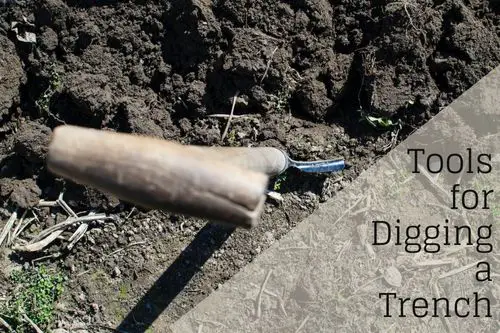Digging a trench is a dirty, backbreaking job. But with the right tools, it doesn’t have to be as bad as it sounds.

In this blog post, we’ll take a look at 4 of the best trenching tools that will make your life infinitely easier. So whether you’re a professional contractor or a DIY weekend warrior, read on to find out which tools are worth your hard-earned money.
Best tools to dig a trench
If you’re planning on doing any trenching in the near future, here are some of the best tools for the job.
1. Excavator.
An excavator is essentially a giant mechanical arm that can be used to dig trenches quickly and efficiently. If you’re working on a large project, an excavator is a necessary piece of equipment. However, if you’re only working on a small trench, you may be able to get away with using a manual digging tool.
2. Trencher.
A trencher is a specialized machine that’s designed specifically for digging trenches. Trenchers are available in both gas-powered and electric models, so you can choose the one that’s right for your needs. Trenchers are fast and efficient, and they can save you a lot of time and effort when compared to digging by hand.
3. Backhoe.
A backhoe is similar to an excavator in that it’s a large mechanical arm that can be used to dig trenches quickly and efficiently. However, backhoes have one major advantage over excavators: they’re much smaller and more maneuverable. This makes them perfect for tight spaces where an excavator simply couldn’t fit.
4. Skid steer loader.
A skid steer loader is a versatile piece of equipment that can be used for all sorts of jobs, including trenching. Skid steers are small and agile, making them perfect for tight spaces. And because they’re so versatile, skid steers can also be used for other tasks such as landscaping, demolition, and even snow removal.
5. Chainsaw.
If you need to dig a narrow trench, a chainsaw may be the right tool for the job. Chainsaws are easy and lightweight to operate, so they can be used in even the smallest areas. However, they’re also quite dangerous, so it’s important to take proper safety precautions when using a chainsaw. You can also use a trencher attachment to turn your chainsaw into a more powerful tool.
6. Border Edger.
If you’re working on a landscaping or gardening project, using a border edger can make your job significantly easier. A border edger is a specialized tool that cuts clean lines along the edge of your trench. This makes it much easier to dig and maintain your trenches, and it also ensures that they look nice and professional.
7. Drain Spade.
If you’re working on a drainage project and need to run drains, a drain spade is an essential tool. Drain spades feature a sharp, triangular blade that’s perfect for cutting through roots and other debris. They are specifically designed to make cutting drainage trenches an easier task, and they can save you a lot of time and effort.
8. Shovel.
Although it’s not as high-tech as some of the other tools on this list, a shovel is still an essential piece of equipment for any trenching project. Whether you’re working by hand or using a powered tool like a trencher, a good shovel will make your job much easier and more efficient.
9. Pick Mattock.
If you’re dealing with hard, rocky soil, a pick mattock can be an invaluable tool. A pick mattock is essentially a variation of the traditional digging tool that features two different types of blades: one for cutting through roots and debris, and the other for breaking up rocks and clay. If you need to dig trenches in difficult terrain, a pick mattock is definitely worth considering.
If you’re planning a trenching project, be sure to invest in the right tools. With the right equipment, your job will go much more smoothly, and you’ll be able to get your project done faster and with fewer headaches.
Can you make money with a trencher?
If you’ve got a trencher that you’re not using, why not rent it out and make some extra cash? Here are a few tips on how to do just that.
Trenching businesses usually charge by linear foot. This means that the price will depend on the length of the trench that needs to be dug. The depth of the trench will also affect the price. Most businesses will charge between $2 and $5 per linear foot, depending on the depth of the trench.
It’s important to factor in the cost of your equipment when determining how much to charge for your services. You’ll need to purchase or lease a trencher, as well as other necessary equipment such as a truck or trailer to haul the trencher to and from job sites. You’ll also need insurance to protect your business in case of any accidents. Once you have all of your expenses figured out, you can start setting your rates.
First, do some research and find out what the going rate is for renting a trencher in your area. This will give you an idea of how much to charge per day or per week. Be sure to check online classifieds and rental equipment websites to get an idea of the competition.
Once you’ve determined your rates, it’s time to start marketing your trencher rental business. The best way to do this is by word-of-mouth. Let your friends, family, and neighbors know that you’re in the business of renting out trenchers. You can also put up flyers in local businesses and post on online classifieds websites.
Finally, when it comes time to actually rent out your trencher, be sure to walk your customer through a quick tutorial on how to operate the machine. This will help ensure that they use it safely and return it in the same condition that they received it in.
Conclusion
There you have it! 9 tools that will make your trench-digging job infinitely easier. So whether you’re a professional contractor or a DIY weekend warrior, make sure you have the right tools for the job before you start digging.
